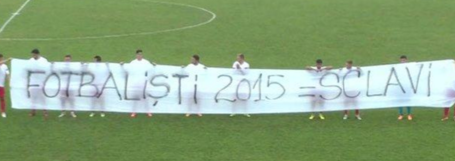April 22 – With scores of their players repeatedly unpaid, Romanian football authorities have eased contract restrictions that will now allow them to move on and not be retained by clubs against their will.
According to the BBC, a campaign by the Romanian players’ union, Afan, has led to the rules being changed affecting about 300 players.
Thanks to the players’ union, those who have not been paid for three months can now file an application with the Romanian Football Federation and will be free to leave in two to four weeks.
British footballer Rhema Obed says he is still owed more than £40,000 in wages from a seven-month spell with Rapid Bucharest at the start of the 2013-14 season.
“For the first three months, I was delaying my rent and using my savings and my girlfriend’s wages,” he said. “That’s how I got by. I was also having to call family back home. It was rather embarrassing, being a footballer, but it was the reality. I was getting food from a team-mate’s mum.”
Obed took his case to FIFA and won but he was frozen out by the club having played only three games. He is still waiting to receive any money and said FIFA is threatening to dock Rapid points if they fail to pay him the wages owed.
Meanwhile according to the BBC, Romanian side Metalul Resita have not paid their players in five months since the club entered administration.
“Players became slaves there,” said Obed, who was once in the same Arsenal youth team as the likes of Jack Wilshere and Francis Coquelin, but was released aged 18.
Afan president Emilian Hulubei, who led the campaign for a change in the law, welcomed the decision but said he feared clubs would still “try to cheat the players with bad practice”.
“We will have a lot of work to do,” said Hulubei. “It’s good because there are a lot of teenagers trapped at clubs and now they will be able to move on.
A statement from international players union FIFPro, which has been rigorously campaigning for players to be paid on time in several countries, said the new rule “ends years of unfair treatment in Romania”.
Contact the writer of this story at moc.l1713605914labto1713605914ofdlr1713605914owedi1713605914sni@w1713605914ahsra1713605914w.wer1713605914dna1713605914

